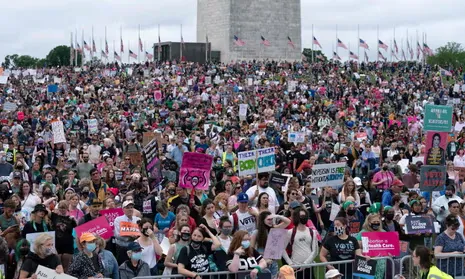Emergency Abortions on the Line: Supreme Court to Deliver Fateful Verdict in Banned States- The US Supreme Court’s looming decision on emergency abortions has the nation on edge. Can hospitals perform life-saving procedures in states with restrictive abortion laws? We explore the legal arguments, potential outcomes, and impact on women’s health.
Introduction: Emergency Abortions on the Line: Supreme Court to Deliver Fateful Verdict in Banned States
The Supreme Court stands poised to make a momentous decision: whether federal law requires hospitals to perform emergency abortions, even in states where the procedure has been banned. On one hand, doctors argue that EMTALA unequivocally compels them to act as lifesavers, regardless of state-imposed restrictions. On the other hand, opponents contend that the law’s language doesn’t explicitly encompass abortion and that such an interpretation would undermine state sovereignty. In states with near-total bans, the question now is: can doctors perform abortions in emergencies to protect a woman’s life or health, even if they are illegal under state law?

This blog delves deep into this crucial case, examining the legal landscape, potential arguments, and the potential consequences of the Court’s decision. We’ll unpack the intricacies of the Emergency Medical Treatment and Labor Act (EMTALA), explore the perspectives of different stakeholders, and consider the impact on women’s health and reproductive rights.
FAQ:
The Court will consider whether federal law requires hospitals to perform emergency abortions, even in states where the procedure is generally banned.
The Emergency Medical Treatment and Labor Act requires hospitals receiving Medicare funding to stabilize patients in emergencies, regardless of their ability to pay.
Proponents argue that EMTALA guarantees access to life-saving procedures, including abortion, and that restricting it would endanger women’s lives.
Opponents argue that EMTALA does not explicitly mention abortion and that allowing it would undermine state laws restricting the procedure.
The Court could rule in favor of hospitals, finding that EMTALA requires emergency abortions, or in favor of the state, allowing unrestricted enforcement of its abortion ban.

Conclusion:
The Supreme Court’s decision on emergency abortions will have far-reaching consequences for women’s health and reproductive rights across the United States. This critical case goes beyond legal wrangling; it touches on fundamental issues of bodily autonomy, access to healthcare, and the very definition of what constitutes an emergency. Regardless of the Court’s ultimate ruling, the national conversation on abortion is sure to continue, prompting reflection on the ethical, legal, and human complexities of this sensitive issue.

Hello i think that i saw you visited my weblog so i came to Return the favore Im trying to find things to improve my web siteI suppose its ok to use some of your ideas
“Don’t be afraid to experiment and try new things! We can learn from each other’s successes and failures.”
Thank you for your sharing. I am worried that I lack creative ideas. It is your article that makes me full of hope. Thank you. But, I have a question, can you help me?